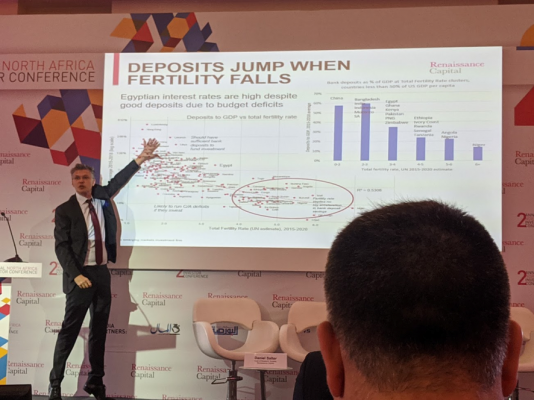THE FUND
The Fund rose 6,6% in January, better than the benchmark index MSCI EFM Africa ex South Africa Net Total Return Index, which rose 6,2%. At a country level, overweigths in Nigeria (33% of fund assets) and overweigths in Egypt (49%) contributed most positively relative the benchmark. The Fund’s underweights in Morocco (0% of fund assets) and underweights in Kenya (5%) contributed most negatively. At the sector level, overweigths in Financials along with overweigths in Health Care contributed most positively, while the underweights in Materials and underweights in Communication Services contributed most negatively relative the benchmark index. The Swedish krona depreciated 3.4% versus the USD in January, increasing the SEK return of the Fund. (all changes in SEK).
During the month, we attended an investor conference in Marrakech, catching up with many of our Egyptian holdings as well as a couple of local Moroccan names. The general impression was a positive outlook for 2020 after a decent 2019, albeit not without challenges. For Egypt, the cumulative 4.5%-points interest rate cuts in 2019 should feed through to loan growth and increased economic activity and together with lower inflation should improve consumer purchasing power. Moroccan companies are benefitting from increased economic activity as well, and are benefitting from a stable environment with low inflation (~1%) and low interest rates (central bank rate at 2.25%). More company specifics in the next monthly update.
No changes were made to the portfolio in January.
MARKET
A good start to the year in most African equity markets (MSCI EFM Africa xSA Net TR +6.2%), and better than other Frontier markets (MSCI FMxGCC Net TR), which rose 3.3% during the month. Zimbabwe was the best African stock market rising 34.1% followed by Nigeria and Rwanda, both rising 12%. Namibia was the worst African market declining 9.1% while South Africa was the second-worst performer, falling 6.4%. (all changes in SEK).
The Egyptian market (Hermes Index +5% in January) actually fell by 1% in local currency terms, but thanks to the strong Egyptian Pound the market return was positive when converted to SEK. The central bank kept rates on hold, giving the economy some more time to digest last year’s cuts. Most economists still expect them to cut by another 1-2%-points in 2020. Saudi Telecom surprised the market and launched a USD 2.4bn bid on Telecom Egypt’s 55% stake in Vodafone Egypt.
The activity in the Nigerian stock market (Nigeria Stock Exchange Main Index +12% in January) increased on the back of the “OMO-effect” (i.e. expiring OMO-bonds being reinvested in the stock market) as well as early dividend season flows (with most dividends due in April and May) and increased demand for stocks offering good dividend yields. Mainly the financial sector benefitted from these flows, until the central bank of Nigeria (CBN) raised the Capital Reserve Ratio (CRR, how much of customer deposits a bank needs to deposit with the central bank) to 27.5% from 22.5% to decrease excess liquidity in the system blamed for pushing the inflation. This makes it harder for the banks to achieve the previously issued rules of keeping Loans to deposits ratios (LDR) above 65%. Most economists blame the border closure to Benin for the inflation spike, and dislike the micromanagement from CBN. The drop in oil price and decreased investment inflows have decreased the FX reserve to below USD 38bn adding uncertainty to the short-term outlook for Nigeria.
In Kenya (Nairobi All Share Index +2.4% in January) the central bank surprised the market by lowering the rates by 0.25%-points to 8.25% to help restore the economic growth, however, there is increased risk to the inflation outlook due to a locust invasion damaging crops. The consumer price index rose by 5.8% in January, versus expectations of 5.7%.
DISCLAIMER: Capital invested in a fund may either increase or decrease in value and it is not certain that you will be able to recover all of your investment. Historical return is no guarantee of future return. The Full Prospectus, KIID etc. are available on our homepage. You can also contact us to receive the documents free of charge. Please contact us if you require any further information: +46 8-5511 4570.


